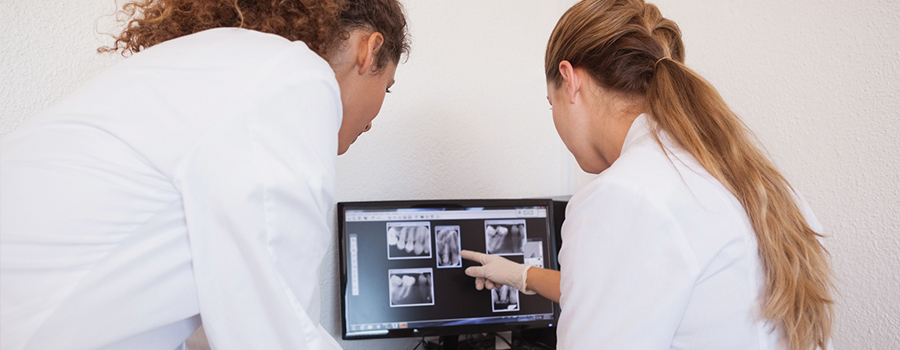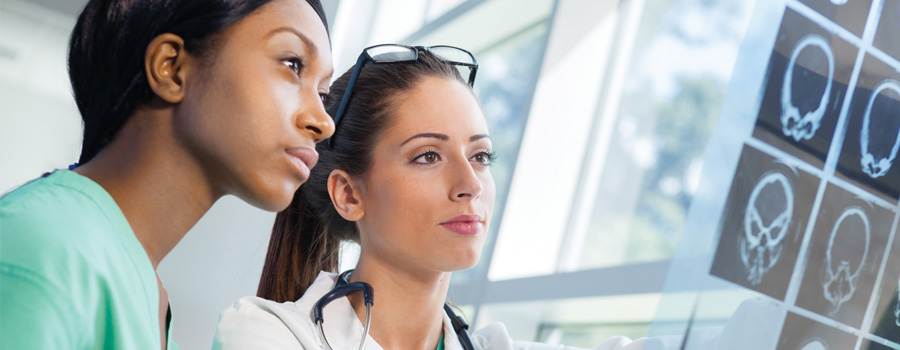
Program Objective:
The objective of the Dental Assisting program is to provide quality educational training designed to meet the current and future needs of the Dental Health Industry. To accomplish this, the following guidelines are established: assist students to choose, prepare for, enter, and be gainfully employed as Dental Assistants; offer a program which emphasizes sound fundamentals while responding to the needs of the Dental Assisting industry; provide courses to meet current and specific needs of the student and this industry.
This program offers a sequence of courses that provides coherent and rigorous content aligned with challenging academic standards and relevant technical knowledge and skills needed to prepare for further education and careers in the Health Science career cluster; provides technical skill proficiency, and includes competency-based applied learning that contributes to the academic knowledge, higher-order reasoning and problem-solving skills, work attitudes, general employability skills, technical skills, and occupation-specific skills,
Master the Dental Hygienist Exam Click Proceed then choose Career Tools|Medical/Nursing
Program Outlook:
The Dental Assisting Program provides students with the technical knowledge and skills for employment as Dental Assistants. Instruction is designed to prepare students to successfully pass the Dental Assisting National Board Examination. Instruction includes a combination of classroom theory and practical experiences through practice on patients in dental clinics. Students are eligible to join HOSA.
Program Content:
The content includes, but is not limited to, dental office and patient management, basic dental laboratory procedures, dental and general anatomy, dental terminology, nutrition, dental instrument and equipment utilization, microbiology, dental pharmacology and anesthesia, chairside assisting and expanded functions, dental office emergencies/CPR, dental radiography, maintenance and asepsis of dental operatory and instrumentation, dental specialty procedures, employability skills, leadership and human relations skills, ethics and jurisprudence, dental materials and preventive dentistry.
Length of Program:
The average length of this program is 1230 (approximately 14 months) for adult students attending part time. Actual time is dependent upon enrollment status and the length of time the student requires to achieve competencies. This program contains occupational completion points designed to prepare students for a position.
Admission Requirements:
- Students must be at least 16 years old and not attending high school
- Application
- Interview by a guidance counselor
- Fees for supplies and textbooks are required.
Entrance Dates:
This program operates on an open-entry, open-exit basis. Students may enter the program anytime during the school year. Entrance is dependent upon space availability. Call (305) 557-1100 for more information.
Graduation Requirements:
- Completion of all Occupational Completion Points (OCP’s)
- Satisfy Minimum Basic Skills Requirements
Mathematics 10 Language 10 Reading 10 - No financial obligations
- Students must complete the Clearance packet to received to receive their program certificate
| OCP | COURSE NUMBER | COURSE TITLE | COURSE LENGTH |
|---|---|---|---|
| A | DEA0725 | Introduction to Dental Assisting | 90 hours |
| B | DEA0726 | Dental Infection Control Assistant | 210 hours |
| C | DEA0727 DEA0728 | Dental Assisting 1 Dental Assisting 2 | 465 hours 465 hours |
Program Cost:
- In-state residents—$2.56 per hour (Subject to change)
- Out of state resident—$10.25 per hour (Subject to change)
- $20.00 application fee
- Material fee—Varies by program
- Identification Card fee—$5.00 per trimester
- Students must purchase books/kits and/or uniforms, if applicable
Program Hours:
Monday through Thursday 4:00 pm—9:00 pm
Approximately Total Cost:
$4,275.00
Employment Requirements:
- Requirements vary per state; on-the-job training or postsecondary training in dental assisting are recommended
- Students are strongly encouraged to earn the Dental Assisting National Board Certification.
Career Opportunities:
Dental Assistant, Front Desk Receptionist, Office Manager.
Salary:
The average wage for this career in Florida is $19.79 hourly or $41,170 annually.
Job Outlook:
Employment of dental assistants is projected to grow 11% from 2020 to 2030.

Program Objective:
The objective of the Medical Assisting program is to provide quality education and training in order to prepare students for employment as medical assistants. The program also strives to meet the demands of the changing Health Care Industry. This program offers a sequence of courses that provides coherent and rigorous content aligned with challenging academic standards and relevant technical knowledge and skills needed to prepare for further education and careers in the Health Science career cluster; provides technical skill proficiency, and includes competency-based applied learning that contributes to the academic knowledge, higher-order reasoning and problem-solving skills, work attitudes, general employability skills, technical skills, and occupation-specific skills, and knowledge of all aspects of Health Science career cluster.
Test Prep (Requires Miami-Dade Public Library card. Choose Career Tools | Medical/Nursing)
Program Outlook:
This is one of the most rapidly expanding professions within the allied health field. The role of the skilled medical assistant has a status of vital importance in the medical profession. Administrative office techniques include oral and written communications, medical records management, and billing and collection techniques. The clinical competencies include: learning first aid and CPR; assisting the physician with medical and surgical procedures; taking vital signs, EKGs and basic X-rays; administering medications; and performing selected laboratory procedures including capillary stick and venipuncture. The student receives supervised practical experience in a physician’s office, clinic, or walk-in care facility following completion of the theory portion of the program. Students are encouraged to join the Health Occupations Students of America (HOSA) and are eligible to be nominated by their instructor to join the National Vocational Technical Honor Society.
Program Content:
The content includes but is not limited to communication, transcultural communication in healthcare, interpersonal skills, legal and ethical responsibilities, health-illness concepts, administrative and clinical duties, emergency procedures including CPR and first aid, emergency preparedness, safety and security procedures, medical terminology, anatomy and physiology, and employability skills.
Length of Program:
The program is 1300 hours and includes 200 hours clinical experience. Approximately 15 months needed to complete the program. This program contains several occupational completion points designed to prepare students for various entry level jobs within this occupational area.
Admission Requirements:
- Students must be at least 16 years old and not attending high school
- Application
- Interview by a guidance counselor
- Physical Examination and Level I Background Check
- Fees for Supplies and textbooks
Entrance Dates:
This program operates on an open-entry, open-exit basis. Students may enter the program anytime during the school year. Entrance is dependent upon space availability. Call (305) 557-1100 for more information.
Career Opportunities:
Medical Assistants can be employed in a physician’s office, laboratory (phlebotomist), health insurance office, medical records facility, emergency room, skilled nursing care facility, hospital (EKG Technician), or medical office.
Graduation Requirements:
- Completion of all Occupational Completion Points (OCP’s)
- Satisfy Minimum Basic Skills Requirements
Mathematics 10 Language 10 Reading 10 - No financial obligations
- Students must complete the Clearance packet to received their program certificate.
| OCP | COURSE NUMBER | COURSE TITLE | COURSE LENGTH |
|---|---|---|---|
| A | HSC0003 | Basic Healthcare Worker | 90 hours |
| B | MEA0002 MEA0501 | Introduction to Medical Assisting Medical Office Procedures | 250 hours 75 hours |
| C | MEA0521 | Phlebotomist, MA | 75 hours |
| D | MEA0543 | EKG Aide, MA | 75 hours |
| E | MEA0581 MEA0530 MEA0573 MEA0506 MEA0942 | Clinical Assisting Pharmacology for Medical Assisting Laboratory Procedures Administrative Office Procedures Practicum Experience | 230 hours 90 hours 125 hours 90 hours 200 hours |
Program Cost:
- In-state residents—$2.56 per hour (Subject to change)
- Out of state resident—$10.25 per hour (Subject to change)
- $20.00 application fee
- Material fee—Varies by program
- Identification Card fee—$5.00 per trimester
- Students must purchase books/kits and/or uniforms, if applicable
Program Hours:
Monday – Friday from 8:30 a.m. to 2:10 p.m.
Monday—Friday 5:30pm—10:30pm
Approximately Total Cost:
$4,317.07
Employment Requirements:
- There are no formal educational requirements for becoming a medical assistant. However, most employers prefer to hire applicants who have completed a medical assisting program.
- Students are strongly encouraged to earn a Registered Medical Assisting (RMA) Certification.
Salary:
The average wage for this career in Florida is $16.31 hourly or $34,800 annually.
Job Outlook:
Employment of medical assistants is projected to grow 18% from 2020 to 2030.

Florida Board of Pharmacy Approved Program | See Rule: 64B16-26.351, F.A.C.
Program Objective:
The objective of the Pharmacy Technician program is to provide quality educational training designed to meet the current and future needs of the Health Industry. To accomplish this, the following guidelines are established: assist students to choose, prepare for, enter, and be gainfully employed as Pharmacy Technicians; offer a program which emphasizes sound fundamentals while responding to the needs of this particular industry; provide courses to meet current and specific needs of the student and this industry.
Program Outlook:
The Pharmacy Technician Program provides students with the technical knowledge and skills for employment as Pharmacy Technicians. Instruction is designed to prepare students to successfully pass the Pharmacy Technician Certification Examination. Instruction includes a combination of classroom theory and practical experiences through in class practice. Students are eligible to join HOSA.
Program Content:
The content includes but is not limited to metric system, medical terminology, medicinal drugs, pharmaceutical compounding, USP 795 standards, sterile techniques, USP 797 and USP 800 standards, maintenance of inventory, IV preparation, receiving and handling of hazardous materials, preparing purchase orders, receiving and checking supplies purchased, printing labels, typing prescription labels, delivering medications, pricing prescription drug orders and supplies, prepackaging unit dose packages, patient record systems, control records, data processing automation in pharmacy, computer application, employability skills, leadership and human relations skills, health and safety, including CPR.
Length of Program:
The average length of this program is 1050 (approximately 24 months) for adult students attending part time. Actual time is dependent upon enrollment status and the length of time the student requires to achieve competencies. This program contains occupational completion points designed to prepare students for a position.
Admission Requirements:
- Students must be at least 16 years old and not attending high school
- Application
- Interview by a guidance counselor
- Fees for supplies and textbooks are required.
Entrance Dates:
This program operates on an open-entry, open-exit basis. Students may enter the program anytime during the school year. Entrance is dependent upon space availability. Call (305) 557-1100 for more information.
Career Opportunities:
Pharmacy Assistant, Pharmacy Technician, Community Pharmacy Technician
Graduation Requirements:
- Completion of all Occupational Completion Points (OCP’s)
- Satisfy Basic Skills Requirements
Mathematics 11 Language 10 Reading 10 - No financial obligations
- Students must complete the Clearance packet to received program certificate.
| OCP | COURSE NUMBER | COURSE TITLE | COURSE LENGTH |
|---|---|---|---|
| A | HSC0003 | Basic Healthcare Worker | 90 hours |
| B | PTN0084 PTN0085 PTN0086 | Pharmacy Technician 1 Pharmacy Technician 2 Pharmacy Technician 3 | 360 hours 300 hours 300 hours |
Program Cost:
- In-state residents—$2.56 per hour (Subject to change)
- Out of state resident—$10.25 per hour (Subject to change)
- $20.00 application fee
- Material fee—Varies by program
- Identification Card fee—$5.00 per trimester
- Liability insurance fee—Varies by program
- Students must purchase books/kits and/or uniforms, if applicable
Program Hours:
Monday—Thursday 4:00 pm—9:00 pm
Approximately Total Cost:
$3,276.00
Employment Requirements:
- Requirements vary per state; on-the-job training or postsecondary training in a Pharmacy Technician program are required in Florida.
- Register to be licensed with the Florida Board of Pharmacy.
- Students are strongly encouraged to obtain the Pharmacy Technician Certification offered by the Pharmacy Technician Certification Board. (PTCE).
Salary:
The average wage for this career is $16.87 per hour or $35,100 annually.
Job Outlook:
Employment of pharmacy technicians is projected to grow 4% from 2020 to 2030.

Program Objective:
The Practical Nursing program is committed to provide the highest quality education so that all of our students are empowered to lead productive and fulfilling lives as lifelong learners and responsible citizens. Through cooperative team efforts, the program provides specialized training so that graduate practical nurses become successfully employed in the health science profession. Students are encouraged to develop and reflect on capabilities which will foster their participation as professionals in the delivery of health care in hospitals, long term/rehabilitation facilities and community based agencies.
NCLEX PN Practice Test (Requires Miami-Dade Public Library card. Choose Career Tools | Medical/Nursing)
Program Outlook:
The Practical Nursing curriculum of study provides the practitioner with the necessary theory and clinical practice to share in the care of individuals along the many steps of the health/illness continuum. Clinical experience is provided at local hospitals and selected health-care facilities. The curriculum is designed to prepare the students to take the NCLEX-PN (National Council Licensure Exam)
Graduates of this program must pass the NCLEX-PN prior to seeking employment as a Licensed Practical Nurse (LPN). Students are eligible to join the Health Occupations Students of America (HOSA) organization.
Program Content:
The content includes, but is not limited to, theoretical instruction and clinical experience in medical, surgical, obstetric, pediatric, and geriatric nursing; theoretical instruction and clinical experience in acute, care, long term care and community settings; theoretical instruction and clinical application of vocational role and function; personal, family and community health concepts; nutrition; human growth and development over the life span; body structure and function; interpersonal relationship skills, mental health concepts; pharmacology and administration of medications; legal aspects of practice; and current issues in nursing.
This program is approved by the State of Florida Board of Nursing. Students who successfully complete the requirements of this program may continue their education by entering the Registered Nurse (RN) Transitional Program at Miami–Dade College or other state and university
Length of Program:
This program is 1,350 hours in length and includes 675 hours of clinical experience. Approximately 15 months are needed to complete the program if attending full time. This program contains an occupational completion point designed to prepare students for an entry level job within this occupational area.
Admission Requirements:
- Students must be at least 16 years old and not attending high school
- Application
- Interview by a guidance counselor and department head
- Physical examination and background check required
- Admission test (TEAS Exam)
- High School Diploma or GED
- Fees for Supplies and textbooks are required
Entrance Dates:
This program operates on an open-entry, open-exit basis. Students may enter the program anytime during the school year. Entrance is dependent upon space availability. Call (305) 557-1100 for more information.
Career Opportunities:
A licensed practical nurse may work in a hospital, nursing home, clinic, doctor’s office, home health agency, private home, or the military.
Graduation Requirements:
- Completion of all Occupational Completion Points (OCP’s)
- Satisfy Minimum Basic Skills Requirements
Mathematics 11 Language 11 Reading 11 - No financial obligations
- Students must complete the Clearance packet to received program certificate.
| OCP | COURSE NUMBER | COURSE TITLE | COURSE LENGTH |
|---|---|---|---|
| A | PRN0098 | Practical Nursing Foundations 1 | 300 hours |
| B | PRN0099 PRN0290 PRN0291 PRN0690 | Practical Nursing Foundations 2 Medical Surgical Nursing 1 Medical Surgical Nursing 2 Comprehensive Nursing and Transitional Skills | 300 hours 300 hours 300 hours 150 hours |
Program Cost:
- In-state residents—$2.56 per hour (Subject to change)
- Out of state resident—$10.25 per hour (Subject to change)
- Application fee $20.00
- Material fee—Varies by program
- Identification Card fee—$5.00 per trimester
- Liability insurance fee—Varies by program
- Students must purchase books/kits and/or uniforms, if applicable
Program Hours:
Monday—Friday 8:30 am—2:10 pm
Monday– Friday 4:00 pm—9:30 pm
Approximately Total Cost:
$5,961.00
Employment Requirements:
- Certificate or diploma program in practical nursing
- Obtain a CPR Certification Card
- Passage of the National Council Licensure Exam for Practical Nurses (NCLEX-PN) .
- Apply for Licensure with the Florida Board of Nursing
Salary:
The average wage for this career in Florida is $22.46 hourly or $46,710 annually.
Job Outlook:
Employment of licensed practical and licensed vocational nurses is projected to grow 9% from 2020 to 2030.
